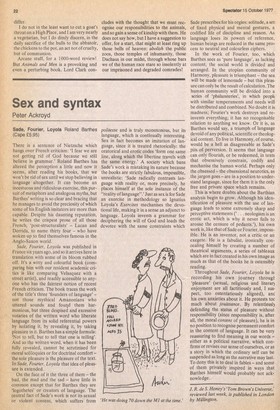Sex and syntax
Peter Ackroyd
Sade, Fourier, Loyola Roland Barthes (Cape £5.95) There is a sentence of Nietzsche which hangs over French criticism: 'I fear we are not getting rid of God because we still believe in grammar.' Roland Barthes has altered the perception a little and now it seems, after reading his books, that we won't be rid of sex until we stop believing in language altogether. It can become an incestuous and ridiculous exercise, this pursuit of metaphors and analogous myths, but Barthes' writing is so clear and bracing that he manages to avoid the preciosity of which some of his English imitators are more than capable. Despite his daunting reputation, he writes the crispest prose of all those French, 'post-structuralists' — Lacan and Derrida, to name thirty four — who have woken up to find themselves famous in the Anglo-Saxon world.
Sade, Fourier, Loyola was published in France six years ago, and so it arrives here in translation with some of its bloom rubbed off. It's a witty and colourful book (comparing him with our resident academic critics is like comparing Velasquez with a street artist), and readily accessible to anyone who has the faintest notion of recent French criticism. The book traces the work of the title's three 'founders of language' — not those mythical Amazonians who uttered sounds and found them harmonious, but three despised and excessive votaries of the written word who liberate language from its solid referential powers by isolating it, by revealing it, by taking pleasure in it. Barthes has a simple formula: 'Not to tell, but to tell that one is telling'. And so the written word, when it has been fully revealed, cannot be scrutinised for moral soliloquies or for doctrinal comfort — the sole pleasure is the pleasure of the text. In Sade, Fourier, Loyola that idea of pleasure is extended.
On the face of it the three of them — the bad, the mad and the sad — have little in common except that for Barthes they are logothetes' or creators of language. The central fact of Sade's work is not its sexual or violent content, which suffers from politesse and is truly monotonous, but its language, which is continually interesting. Sex in fact becomes an imitation of language, since it is treated rhetorically: the oratorical and erotic codes 'form one same line, along which the libertine travels with the same energy.' A society which bans Sade's work is mistaking its nature because the books are strictly fabulous, impossible, unrealistic: `Sade radically contrasts language with reality or, more precisely, he places himself at the sole instance of the "reality of language".' Just as sex is for Sade an exercise in methodology so Ignatius Loyola's Exercises mechanises the devotional life, making it in a sense an adjunct to language. Loyola invents a grammar for deciphering the will of God and loads the devotee with the same constraints which Sade prescribes for his orgies: solitude, a set of fixed physical and mental gestures, a codified life of discipline and reason. As language loses its powers of reference, human beings are reduced in the same process to neutral and colourless ciphers.
In the work of Fourier, too, which Barthes sees as 'pure language', as lacking content, the social world is divided and arranged. In the utopian community of Harmony, pleasure is triumphant — the sea will be made of lemonade — but this pleasure can only be the result of calculation. The human community will be divided into a series of 'phalansteries', in which peoplt with similar temperaments and needs will be distributed and combined. No doubt it is madness; Fourier's work destroys and reinvents everything; it has no recognisable relation to anything we know. Or it is, as Barthes would say, a triumph of language devoid of any political, scientific or theological content. To live in Harmony, of course, would be a hell as disagreeable as Sade's pits of perversion. It seems that language can only flourish, or be redeemed, in texts that obsessively constrain, codify and mechanise the human world. Perhaps only the obsessed — the obsessional neurotics, as , the jargon goes — are in a position to understand language, since for them it is the only free and private space which remains.
This is where doubts about the Barthian analysis begin to grow. Although his identification of pleasure with the use of language leads to some extremely sharp and perceptive statements (' . . . neologism is an erotic act, which is why it never fails to arouse the censure of pedants.'), his own work is, like that of Sade or Fourier, impossible. He is an inventor, not a critic or an exegete. He is a fabulist, ironically concealing himself by creating a number of theatrical arguments, a series of tableaux which are in fact created in his own image as much as that of the books he is ostensibly reading.
Throughout Sade, Fourier, Loyola he is recording his own journey througt 'pleasure' (sexual, religious and literar) enjoyment are all factitiously and, I suspect, too ostentatiously aligned), anc his own anxieties about it. He protests toc much about jouissance . By relentlessly defending the status of pleasure without responsibility (since responsibility is, after all, the moral content of pleasure), he is in no position to recognise permanent comfort in the content of language. It can be very reassuring to find meaning in our words — either as a political narrative, which confirms or revises our sense of ourselves, or as a story in which the ordinary self can be suspended as long as the narrative may last. To deny this is to deal in fables and some of them privately inspired in ways that Barthes himself would probably not acknowledge.
J. R. de S. Honey's 'Tom Brown's Universe,' reviewed last week, is published in London by Millington.


































 Previous page
Previous page